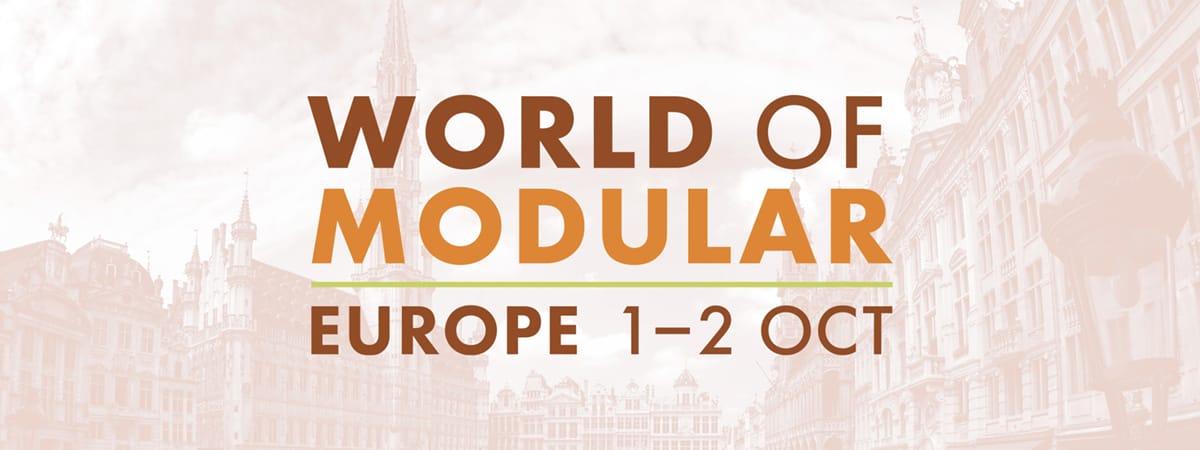The Digitalization of Offsite Construction: Trends & Best Practices to be Featured at World of Modular Europe
Digitalization and ever-advancing project modelling software have been aiding traditional manufacturers, builders, and designers for years. More recently, tech-savvy modular and offsite construction stakeholders have also embraced these tools, adding their own knowledge and data to create newer, faster, more efficient ways of building. Together with quickly-evolving AI-powered tools, these builders are now pushing the boundaries of what’s possible with offsite construction. In an effort to expand that knowledge across the industry, the Modular Building Institute (MBI), the world’s largest international trade association for the commercial modular construction industry, is bringing its premier event to Brussels, Belgium, in October, 2024.
World of Modular Europe, an international conference hosted by MBI on 1-2 October, will feature speakers, exhibitors, and attendees from across Europe and around the globe. In addition to manufacturers and designers, World of Modular Europe will feature some of the leading voices in the use of BIM, digital twins, and AI in offsite construction. The two-day conference will offer key insights, best practices, and the opportunity to meet leaders and stakeholders from every corner of European industry.
How is Digitalization Changing Offsite Construction?
“Digitalization hasn't fully changed the offsite construction sector yet,” says Charlotte Garret, Head of Industry Strategy at KOPE and speaker at World of Modular Europe. “While designers and project managers have made progress using advanced BIM models and project management tools, these improvements often stay within individual projects or with specific designers or supplier who have invested in the technology. This means a large part of the supply chain, especially manufacturers and suppliers, misses out on these digital advancements.”
“There needs to be industry-wide standards and platforms to make digitalization and integration of products and processes seamless,” continues Garret. “Offsite construction methods are already standardized and rule-based, making them ideal for digitalization.”
“Digitization and BIM are the keys to success for offsite construction,” adds Kris Droszcz, Founder of Poland-based Rebel Concept and fellow World of Modular Europe presenter. “By having all your project data in a detailed BIM model we can easily collect information about a project’s materials, cost, or count. In fact, we have created our own Revit addons and developed scripts to automate those processes. And by using AI-based tools, we have increased our efficiency significantly.”
The Value of Data
With the growing importance of digital building tools, there’s another element of construction projects that’s becoming arguably more valuable than the project itself: big data.
“Having correct data available any time you need it saves time and money but also ensures the safety of the structure,” says Droszcz. “It gives insight into the full life cycle of the building. And from a design standpoint, it allows you to control standards and the quality of the project. For example, if you are working in different countries and you have to trace all material certificates and codes for local markets, it is easy to switch between the standards and metrics of different regions instead of redesigning your project from scratch.”
“To unlock its full potential,” adds Garrett, “data must be standardized, complete, structured, and readily accessible. This will provide us in the industry with valuable insights that will help us improve versatility and interoperability, enabling seamless integration across teams and applications and facilitating quick comparisons and informed decisions.
“With reliable data at their fingertips, designers can identify and tailor solutions quickly and easily to meet client requirements, supported by reliable insights.”
Educating the Industry in Brussels
World of Modular Europe will offer attendees the chance to learn and converse directly with Garrett, Droszcz, and dozens of other modular and offsite construction industry leaders.
“I have been attending MBI’s World of Modular in the United States for years,” says Droszcz, “and I am happy that it’s finally beginning to grow here in Europe. Europe has great manufacturers, engineers and architects that can share knowledge during these events, and I believe that collaboration and learning from each other is the best thing we can do to grow offsite modular industry together.”
Droszcz believes his presentation will be of particular interest to fellow design professionals. “I will show the real value of design tools and DfMA using automation scripts in BIM software that improves the efficiency of a project from start to finish.”
Garrett is equally excited for her presentation.

As Head of Industry Strategy at KOPE, Charlotte Garrett works closely with partner organizations and clients in the offsite construction sector, understanding their specific needs and challenges, and demonstrating how KOPE’s platform can streamline their design and project delivery processes. By aligning its software capabilities with its clients’ operational requirements, KOPE ensures that it effectively supports its clients’ goals of efficiency, quality, and scalability.

As an architect, founder and CEO of Rebel Concept, and founder and partner at iQ module / Bud-Invest Group, Krzysztof Droszcz has experience in architectural design, business development, modular and offsite technology, engineering, and construction. His companies collaborate with clients to design, manufacture, and QC modular buildings from the ground up using a variety of innovative AR-, VR-, and AI-powered tools.
“I will explore the ecosystem of demand, development, and deployment,” says Garrett, “highlighting the crucial role of standardization within this framework. By standardizing technical systems, repeatable processes, and stable relationships, we can streamline operations, enhance predictability, and foster continuous innovation.
“One of the key points of the presentation,” adds Garrett, “will be addressing the hurdles we face in delivering scalable solutions, including issues of visibility, variation, and verification. I will talk through some UK initiatives that have successfully navigated these challenges and where I think they should go next, offering valuable lessons for construction.”
“Digitization is a necessity and there is no other way to follow today’s trends and speed without it,” concludes Droszcz. “AI is a powerful tool, too, capable of analyzing big data in moments that would take a human much, much longer. AI is not a substitute, though; we should only be using it to assist us. At World of Modular Europe, attendees will learn how.”

World of Modular Europe, presented by the Modular Building Institute, comes to Brussels on 1-2 October.
Join the Industry in Brussels, 1-2 October, 2024
"I'm so excited about the opportunity to connect with forward-thinking professionals from across the construction industry," says Garrett. "It’s inspiring to share ideas and collaborate on innovative solutions that can drive our industry forward.”
See all speakers and presentations from the 2024 World of Modular Europe.
About the Author: John McMullen, PCM, is the marketing director for the Modular Building Institute. You can reach him directly at mcmullen@modular.org or on LinkedIn.
More From Modular Advantage
AoRa Development Aims for New York’s First Triple Net Zero Building Using Modular Methods
More cities are providing funding for newer infrastructure projects as long as they meet sustainability requirements. This is how modular can fit the bill, thanks to its lower waste production.
Developers and Designers: Lessons Learned with Modular Design
Modular construction is attractive to many developers because sitework and module construction can occur simultaneously, shortening the schedule and reducing additional costs.
UTILE: Putting Modular Building on a Fast Track
In Quebec, UTILE is taking the lead in creating affordable modular buildings to help decrease the student housing shortage. During the process, the company discovered what it takes to make the transition to modular building a success.
Sobha Modular Teaches Developers How to Think Like Manufacturers
With its 2.7 million square foot factory in UAE, Sobha Modular is bringing both its high-end bathroom pods to high-end residences to Dubai while developing modular projects for the U.S. and Australia.
RoadMasters: Why Early Transport Planning is Make-or-Break in Modular Construction
In modular construction, transportation is often called the “missing link.” While it rarely stops a project outright, poor planning can trigger costly delays, rerouting, and budget overruns.
Navigating Risk in Commercial Real Estate and Modular Construction: Insights from a 44-Year Industry Veteran
Modular projects involve manufacturing, transportation, and on-site assembly. Developers must understand exactly what they are responsible for versus what they subcontract. Risk advisors should research the developer’s contractors, subcontractors, and design-build consultants—especially the modular manufacturer.
Art²Park – A Creative Application of Modular and Conventional Construction
Art²Park is more than a park building—it’s a demonstration of what modular construction can achieve when thoughtfully integrated with traditional materials. The use of shipping containers provided not only speed and sustainability benefits but also a powerful structural core that simplified and strengthened the rest of the building.
Building Smarter: A New Standard in Modular Construction Efficiency
Rising material prices, labour shortages, expensive financing and tightening environmental rules have made conventional construction slower, costlier, and more unpredictable. To keep projects on schedule and within budget, builders are increasingly turning to smarter industrialized methods.
Resia: Breaking All the Rules
Resia Manufacturing, a division of U.S.-based Resia, is now offering prefabricated bathroom and kitchen components to industry partners. Its hybrid fabrication facility produces more precise bathroom and kitchen components (modules) faster and at lower cost than traditional construction. Here’s how Resia Manufacturing does it.
How LINQ Modular Innovates to Bring Modular To The Market in the UAE and Beyond
LINQ Modular, with an office and three manufacturing facilities in Dubai, is a modular firm based in United Arab Emirates. The company is on a mission: to break open the housing and construction markets in the Gulf Cooperation Council (GCC) area with modular.










